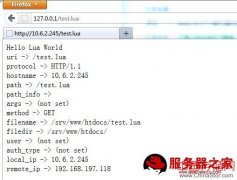本篇分享了Nginx+tomcat负载均衡集群服务器中配置多站点的方法,希望对于初学Nginx服务器相关的朋友有帮助,更多Nginx安装、配置、报错处理等资源请本站内搜索。。
举个例子,现在是这样的情况:我现在有a、b、c三个不同的应用,每个Tomcat集群机(一共3个)上都建立了这三个应用的虚拟主机,我要把这三个应用用一个nginx来负载均衡。
中间测试了很多次,失败的过程就不多说了,直接说最终解决的办法。
首先要把3个虚拟主机的域名(a.server110.com、b.server110.com、c.server110.com)都指向到nginx机的公网ip上。
然后还是修改nginx的配置文件nginx.conf:
配置文件中upstream段还是保持不变,依旧是3个tomcat集群机的地址及负载因子:
upstream gnaiqeh {
server 192.168.0.11:8080 weight=1;
server 192.168.0.12:8080 weight=1;
server 192.168.0.13:8080 weight=1;
}
因为有3个应用,所以应该有3个server段,这里只写其中一个,其他两个只需要修改一下server_name即可:
server {
listen 80;
server_name a.server110.com; #另外两个是b.server110.com、c.server110.com
location / {
root html;
index index.jsp index.html index.htm;
proxy_redirect off;
proxy_set_header Host $host; #这一句至关重要
proxy_set_header X-Real-IP $remote_addr;
proxy_set_header X-Forwarded-For $proxy_add_x_forwarded_for;
proxy_pass http://gnaiqeh;
}
error_page 500 502 503 504 /50x.html;
location = /50x.html {
root html;
}
}
proxy_set_header是nginx的http代理模块中的一个指令。
在nginx中的默认proxy是只能对后面real server做端口转发的,而不能做域名转发,即默认的是:
proxy_set_header Host $proxy_host;
我们要通过域名转发就必须改为:
proxy_set_header Host $host;
最后修改tomcat的配置文件server.xml,主要是配置虚拟主机:
<Host name="a.server110.com" appBase="webapps-a"
unpackWARs="true" autoDeploy="true"
xmlValidation="false" xmlNamespaceAware="false">
<Context path="" docBase="/mnt/a" reloadable="true" crossContext="true"/>
</Host>
<Host name="b.server110.com" appBase="webapps-b"
unpackWARs="true" autoDeploy="true"
xmlValidation="false" xmlNamespaceAware="false">
<Context path="" docBase="/mnt/b" reloadable="true" crossContext="true"/>
</Host>
<Host name="c.server110.com" appBase="webapps-c"
unpackWARs="true" autoDeploy="true"
xmlValidation="false" xmlNamespaceAware="false">
<Context path="" docBase="/mnt/c" reloadable="true" crossContext="true"/>
</Host>
3台集群机均改成上面一样的。
然后重启nginx,重启tomcat,测试访问三个域名都通过,打完收工。
声明: 此文观点不代表本站立场;转载须要保留原文链接;版权疑问请联系我们。










